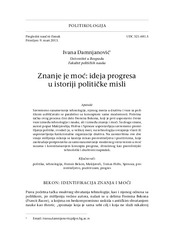Knowledge is power: Idea of progress in history of political thought
Znanje je moć - ideja progresa u istoriji političke misli
| dc.creator | Damnjanović, Ivana | |
| dc.date.accessioned | 2021-04-02T12:04:02Z | |
| dc.date.available | 2021-04-02T12:04:02Z | |
| dc.date.issued | 2013 | |
| dc.identifier.issn | 1820-6700 | |
| dc.identifier.uri | http://rfpn.fpn.bg.ac.rs/handle/123456789/394 | |
| dc.description.abstract | Contemporary understanding of technology, its place in society and connection to politics, had shaped together with concept of modernity itself. Starting point of this process is in the works of Francis Bacon, who was the first to establish firm relations between technology and science, as well as between knowledge and power. On the other hand, authors like Machiavelli, Hobbes and Spinoza establish modern political thought, bringing politics down to technology of power conquest or of functional organization of society. Enlightenment and positivism embrace legacy of both these lines of thought, and complement presumptions for self-reflection of modernity with faith in the power of reason, as well as emerging concept of both technological and social progress. | en |
| dc.description.abstract | Savremeno razumevanje tehnologije, njenog mesta u društvu i veze sa politikom uobličavalo se paralelno sa konceptom same modernosti. Početnu tačku ovog procesa čini delo Frensisa Bekona, koji je prvi uspostavio čvrste veze između tehnologije i nauke, ali i između znanja i moći. Sa druge strane, autori poput Makijavelija, Hobsa i Spinoze uspostavljaju savremeno promišljanje politike, svodeći je, u velikoj meri, na tehnologiju osvajanja vlasti ili uspostavljanja funkcionalne organizacije društva. Na zaostavštinu ove dve struje mišljenja oslanja se kasnija misao prosvetiteljstva i pozitivizma, koja zaokružuje pretpostavke za samorazumevanje modernog sveta verom u moć razuma i konstituisanjem koncepta progresa, shvaćenog kao pravolinijski tehnološki i društveni napredak. | sr |
| dc.publisher | Univerzitet u Beogradu - Fakultet političkih nauka, Beograd | |
| dc.rights | openAccess | |
| dc.source | Godišnjak Fakulteta političkih nauka | |
| dc.subject | Politics | en |
| dc.subject | technology | en |
| dc.subject | Francis Bacon | en |
| dc.subject | Machiavelli | en |
| dc.subject | Thomas Hobbes | en |
| dc.subject | Spinoza | en |
| dc.subject | Enlightenment | en |
| dc.subject | positivism | en |
| dc.subject | progress | en |
| dc.subject | politika | sr |
| dc.subject | tehnologija | sr |
| dc.subject | Frensis Bekon | sr |
| dc.subject | Makijaveli | sr |
| dc.subject | Tomas Hobs | sr |
| dc.subject | Spinoza | sr |
| dc.subject | prosvetiteljstvo | sr |
| dc.subject | pozitivizam | sr |
| dc.subject | progres | sr |
| dc.title | Knowledge is power: Idea of progress in history of political thought | en |
| dc.title | Znanje je moć - ideja progresa u istoriji političke misli | sr |
| dc.type | article | |
| dc.rights.license | ARR | |
| dc.citation.epage | 29 | |
| dc.citation.issue | 9 | |
| dc.citation.other | 7(9): 9-29 | |
| dc.citation.rank | M51 | |
| dc.citation.spage | 9 | |
| dc.citation.volume | 7 | |
| dc.identifier.fulltext | http://rfpn.fpn.bg.ac.rs/bitstream/id/240/391.pdf | |
| dc.identifier.rcub | https://hdl.handle.net/21.15107/rcub_rfpn_394 | |
| dc.type.version | publishedVersion |

